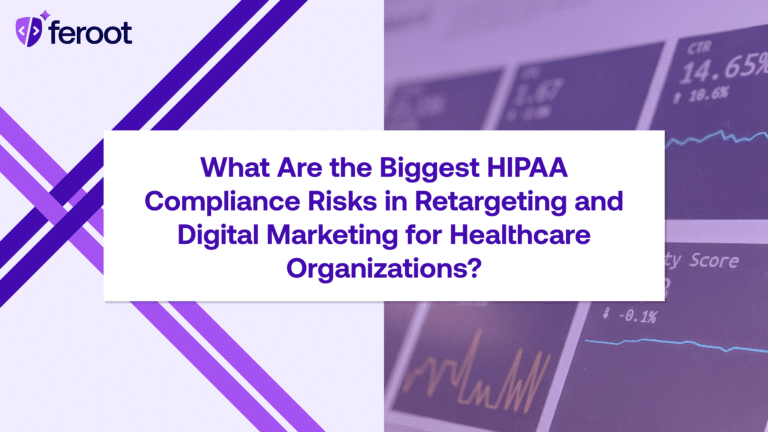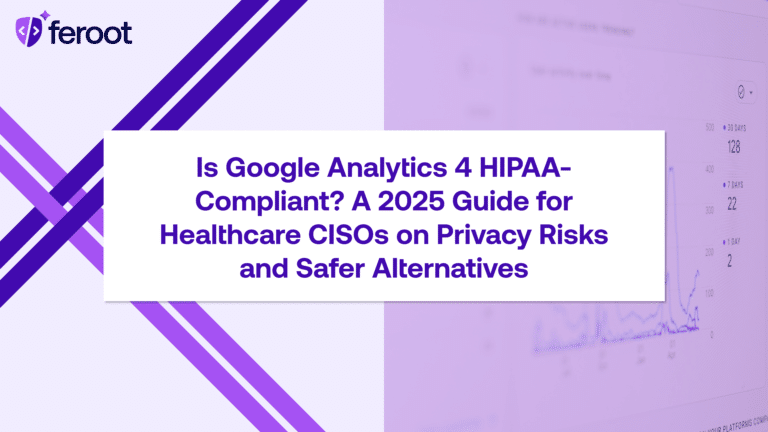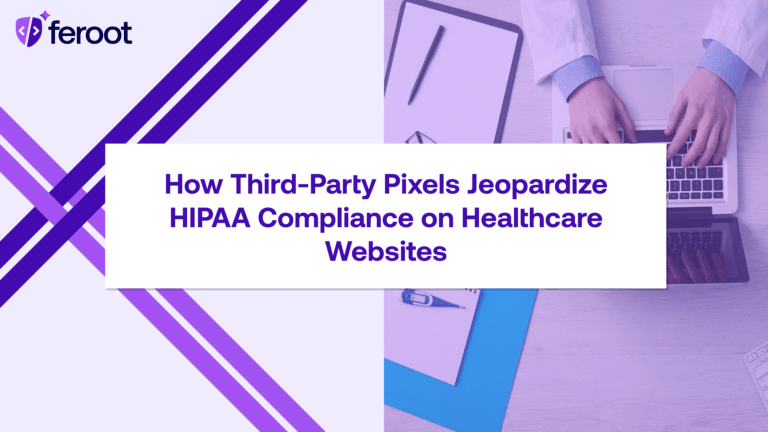On April 9, 2025, Blue Shield of California sent shockwaves through the healthcare industry with a data breach notification revealing that protected health information (PHI) may have been shared with Google Ads for nearly three years due to a misconfigured Google Analytics setup. This incident, affecting an undisclosed number of members, underscores the critical risks of noncompliance with HIPAA rules for online tracking technologies. As healthcare providers strive to protect patient data, this case study serves as a timely reminder of the urgent need for robust compliance measures. Feroot Security’s HealthData Shield AI offers a powerful solution to prevent such breaches, ensuring HIPAA compliance with ease and efficiency.
What Happened: The Blue Shield Data Breach
Blue Shield of California, like many healthcare organizations, used Google Analytics to track website usage on certain member-facing sites, aiming to enhance user experience. However, on February 11, 2025, the insurer discovered a critical misconfiguration: between April 2021 and January 2024, Google Analytics was set up to share member data with Google Ads, a platform used for targeted advertising. This data likely included sensitive PHI, such as:
- Insurance plan name, type, and group number
- City, zip code, gender, and family size
- Blue Shield-assigned online account identifiers
- Medical claim service dates, service providers, patient names, and financial responsibilities
- “Find a Doctor” search criteria and results (location, plan name, provider details)
While Blue Shield emphasized that no bad actors were involved and Google did not share the data further, the unauthorized disclosure of PHI to a third party for advertising purposes constitutes a reportable HIPAA breach. The connection between Google Analytics and Google Ads was severed in January 2024, and Blue Shield initiated a comprehensive review of its websites and security protocols to prevent further issues. However, the breach’s scope and duration—nearly three years—highlight the devastating consequences of oversight in managing online tracking technologies.
HIPAA Noncompliance: How Online Tracking Technologies Contributed
The U.S. Department of Health and Human Services (HHS) provides clear guidance on the use of online tracking technologies by HIPAA-covered entities, emphasizing that any collection or disclosure of PHI must comply with the HIPAA Privacy and Security Rules. Key points include:
- Business Associate Agreements (BAAs): Vendors handling PHI must sign a BAA to ensure HIPAA compliance. Google explicitly states that Google Analytics is not HIPAA-compliant and does not offer a BAA, making its use on pages handling PHI inherently risky.
- Data Minimization: HIPAA requires entities to collect and share only the minimum PHI necessary. The Blue Shield breach involved sharing detailed member data, including medical and search information, far beyond what was needed for analytics.
- Unauthorized Disclosure: Sharing PHI with Google Ads for advertising purposes without member consent violates HIPAA’s Privacy Rule, as seen in Blue Shield’s case.
The breach likely stemmed from a lack of visibility into how Google Analytics was configured and what data it was collecting. As Ian Cohen, CEO of Lokker, noted, “Many healthcare companies are caught unaware of potential data privacy problems because they either don’t fully know what their analytics tools are collecting, or they don’t know how to set up Google Analytics correctly.” This technical misconfiguration turned a routine analytics tool into a compliance nightmare, exposing Blue Shield to legal, financial, and reputational risks.
The Urgency for Healthcare Providers
The Blue Shield incident is not isolated. In 2024, Kaiser Foundation Health Plan reported a similar breach involving online tracking technologies, affecting 13.4 million individuals. These cases highlight a growing trend of HIPAA violations linked to web trackers, driven by the complexity of third-party data collection and the lack of HIPAA-compliant configurations. The HHS Office for Civil Rights has warned about such risks, and while no enforcement actions have been issued for web tracking cases as of April 2025, the potential for fines, lawsuits, and loss of patient trust looms large. Blue Shield now faces multiple class-action lawsuits, underscoring the legal ramifications of noncompliance.
Healthcare providers must act swiftly to avoid similar breaches. The prolonged duration of Blue Shield’s data sharing—nearly three years—demonstrates how easily misconfigurations can go undetected without proactive monitoring. With websites and patient portals handling sensitive PHI, the stakes are higher than ever.
Recommendations for Healthcare Providers

To prevent breaches like Blue Shield’s and ensure HIPAA compliance, healthcare providers should adopt the following measures:
- Conduct a Comprehensive Tracker Audit: Identify all tracking technologies on your websites and patient portals. Ensure that trackers like Google Analytics are restricted to non-HIPAA-covered pages (e.g., general FAQs or blogs) and not used on authenticated pages handling PHI, such as appointment scheduling or patient portals.
- Implement Data Minimization: Configure trackers to collect only the minimum data necessary for their purpose. Avoid sharing PHI, such as medical details or search queries, with third-party vendors unless absolutely required and covered by a BAA.
- Verify Business Associate Agreements: Ensure that all third-party vendors handling PHI sign a BAA. If a vendor, like Google Analytics, does not offer a BAA, explore HIPAA-compliant alternatives like Matomo for analytics.
- Enable Real-Time Monitoring: Deploy automated tools to continuously monitor and block unauthorized data access or PHI exfiltration by trackers, pixels, or scripts. This is critical for detecting misconfigurations before they lead to breaches.
- Train Staff and Review Policies: Educate IT and compliance teams on HIPAA’s online tracking rules and regularly update security protocols. Automated compliance solutions can reduce the burden of manual oversight.
- Engage Cybersecurity Experts: Partner with specialized vendors to enhance client-side security and ensure compliance with HIPAA and other regulations, such as CCPA and GDPR.
How Feroot HealthData Shield AI Can Help
Feroot Security’s HealthData Shield AI is a game-changing solution designed to simplify HIPAA compliance and protect healthcare websites from breaches like Blue Shield’s. Launched in February 2025, this AI-powered platform automates the detection, analysis, and control of tracking technologies, ensuring that PHI remains secure. Here’s how it addresses the challenges exposed by the Blue Shield breach:
- Automatic Discovery and Protection: HealthData Shield AI scans websites and patient portals to identify all tracking technologies, including pixels, scripts, and analytics tools. It detects potential PHI exfiltration in real time, preventing unauthorized data sharing with third parties like Google Ads.
- Real-Time Monitoring and Blocking: The platform proactively monitors data flows and blocks unauthorized access or transmission of PHI, catching misconfigurations before they become breaches. This eliminates the risk of prolonged exposures, as seen in Blue Shield’s three-year incident.
- Automated BAA Management: HealthData Shield AI tracks third-party vendors and verifies BAAs, alerting providers to non-compliant tools like Google Analytics. It streamlines vendor management, ensuring all parties adhere to HIPAA requirements.
- Multi-Regulatory Compliance: Beyond HIPAA, the platform supports compliance with CCPA, GDPR, and other privacy laws, making it ideal for healthcare providers operating across jurisdictions.
- Cost and Time Savings: By automating 99% of manual compliance tasks, HealthData Shield AI reduces costs by up to 95% and frees up IT and compliance teams to focus on patient care. Its seamless integration with existing security infrastructure ensures effortless adoption.
Feroot’s proven AI, which recently uncovered hidden data pipelines in DeepSeek’s platform, powers HealthData Shield AI to deliver unmatched threat detection and compliance attestation. Healthcare providers can trust Feroot to safeguard patient data and maintain regulatory compliance across their digital footprint.
Take Action Now
The Blue Shield of California data breach is a stark reminder that even well-intentioned use of analytics tools can lead to catastrophic HIPAA violations if not properly managed. Healthcare providers must prioritize compliance with HHS’s online tracking guidance to protect PHI and avoid legal and reputational damage. Feroot Security’s HealthData Shield AI offers an automated, efficient, and reliable solution to ensure your websites and patient portals remain secure and compliant.
Don’t wait for a breach to act. Visit Feroot’s HealthData Shield AI page to learn more or schedule a free website assessment at feroot.com. Protect your patients, your reputation, and your bottom line with Feroot Security today.


